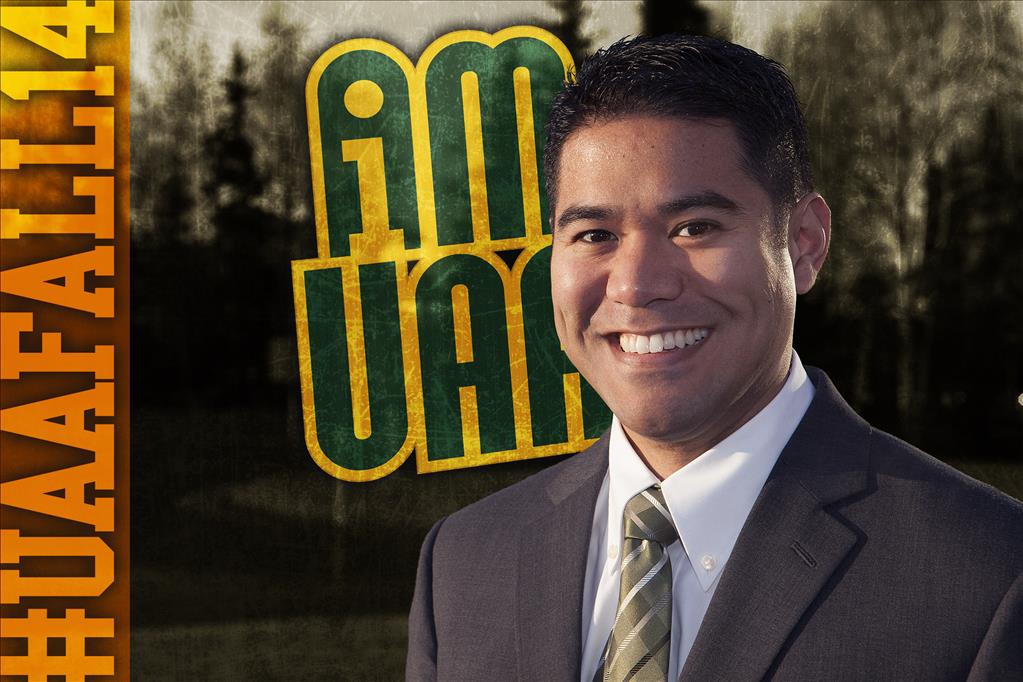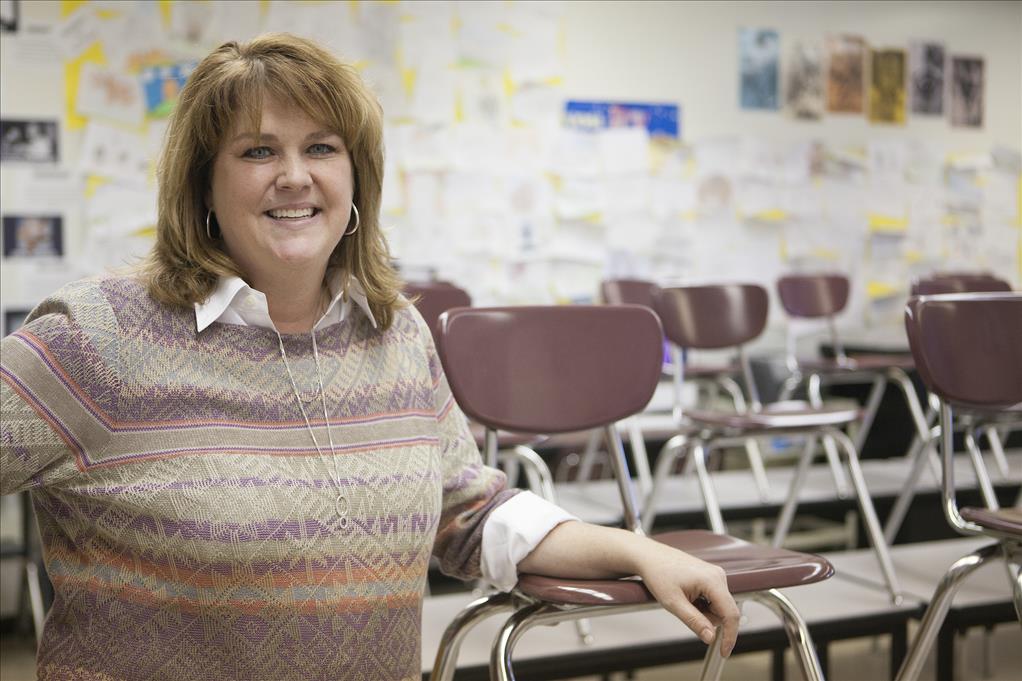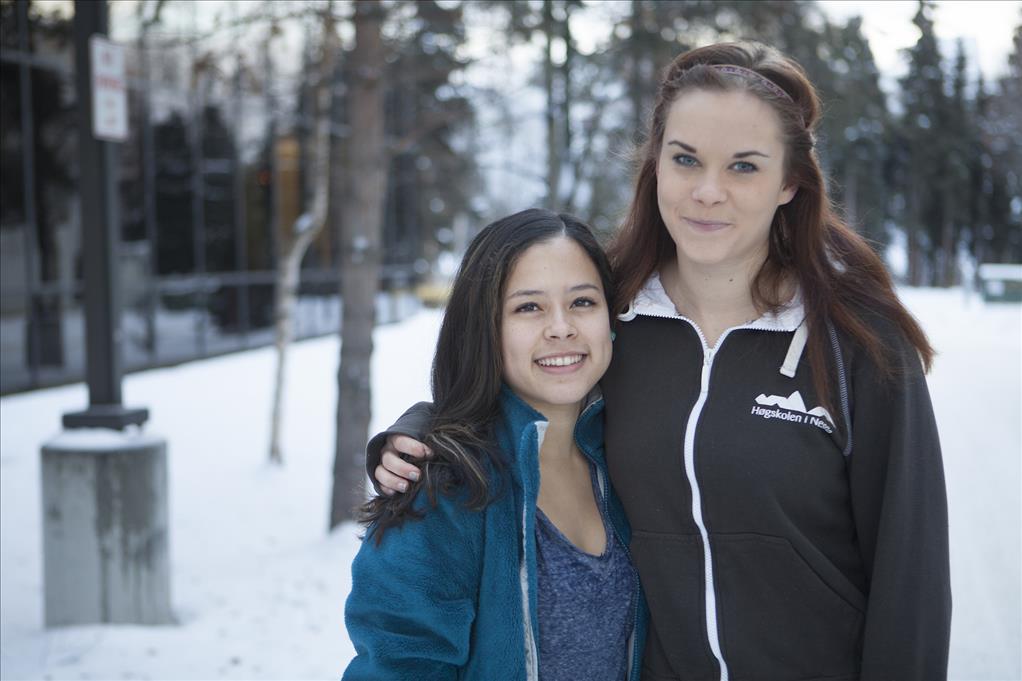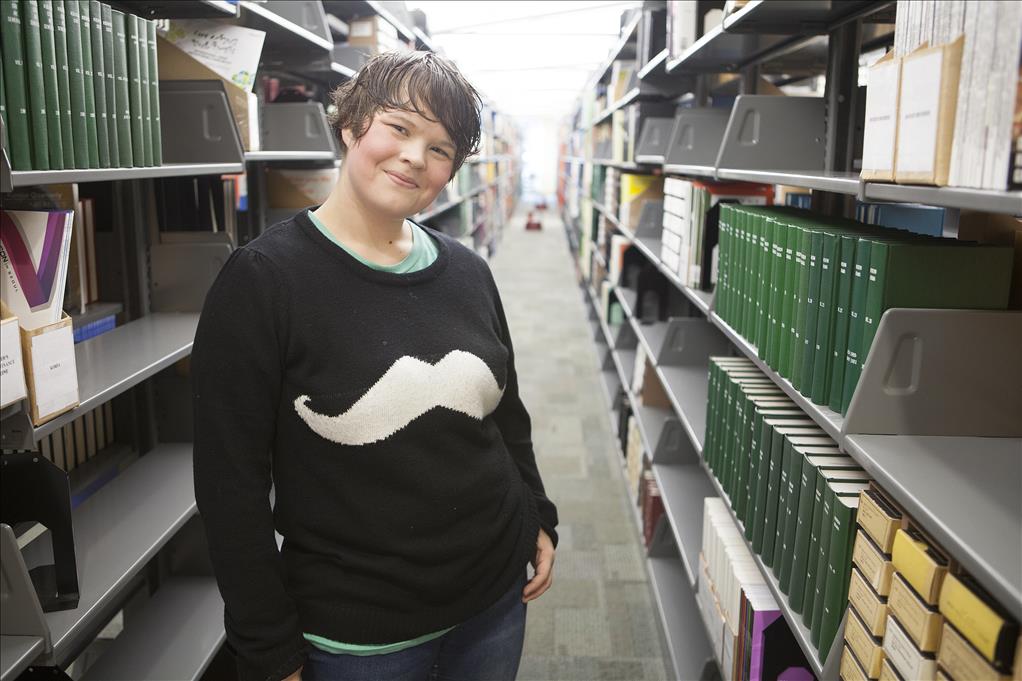Alumni of Distinction: Ted Trueblood
by joey |
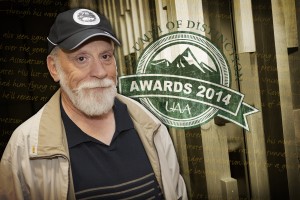
Ted Trueblood, 2014 Alumni of Achievement recipient. (Photo by Philip Hall/University of Alaska Anchorage)
When Ted first moved to Anchorage, there were only two paved roads in the entire city. He remembers looking over the fence of his childhood home (where the state's tallest building now stands) and being completely enthralled when work crews extended the sidewalk all the way to 8th Avenue. Ted arrived at the right time to launch a long career in civil engineering and it's safe to say he had a hand in building the city and-through his work with Alaska Railroad-the entire state.
Ted's also seen significant growth from UAA as well, particularly the booming engineering program he has supported over the years. Ted endows a chair in arctic engineering; he served as founding president of the UAA Alumni Association and throughout his career had a well-justified policy of only hiring University of Alaska graduates. His list of accolades runs from Alaska Engineer of the Year to Rotary District Governor-a position that had him flying to every local club from the Yukon to Siberia. Now he can add Alumni of Achievement, the award he'll receive at this year's Green & Gold Gala.
Every question or thought leads him to an engrossing anecdote or entertaining story about his work throughout Alaska. Just ask about the time he brought his wife to watch a remote mountain railroad tunnel being removed with high explosives. With Ted, toxic chemical smoke and bridge installation make for a good date night. "You have to be ready for this if you marry an engineer," he laughed.
He's seen a lot of changes in a still-growing state, and he's dedicated to creating and providing opportunities for UAA students in his retirement. "For a civil engineer, this is prime ground," he said of Alaska. "There's a lot to do. Even just putting piped utilities in all of the remote villages, it'll take decades."
Army Corps of (Teenage) Engineers
Like many Anchorage residents of his generation, Ted can tell a story about the Good Friday Earthquake changing his life-he just happened to be in Massachusetts at the time. He enrolled at MIT and was wavering in his original interest in biochemistry for two main reasons-the biochem labs smelled horrific, and job prospects would be slim in Alaska. While debating his academic options in Cambridge, tectonic plates rattled the other end of the continent and set his plans in motion. "The earthquake is why I got into civil engineering," he stated.
Returning to Anchorage the summer after his freshman year, Ted saw a damaged landscape desperately in need of engineers. His high school-at the time Anchorage High, now West High-had been reduced from two stories to one since he graduated a year earlier. "For an engineer, that was a good summer," Ted said. "We were busy."
Ted's older brother-working towards an electrical engineering degree at University of Washington-came home for a job with the Army Corps of Engineers and enlisted Ted's help. Their parents had moved back to Idaho, so the brothers bunked on base at bachelor officer's quarters and spent the summer rebuilding their hometown.
"The Corps was charged with fixing enough of Alaska before winter so the schools could open and water and sewer worked," Ted explained. With a crisis on their hands, the Corps soon promoted Ted to resident engineer for the repair of Fort Richardson's schoolhouses, the base field house and Birchwood Elementary. "At some point they figured out I knew something, I guess" Ted laughed.
He spent the summer driving an olive green jeep around base while sporting the white hardhat and castle decals of the Army Corps. He oversaw 12 million dollars worth of contracts. It was 1964 and Ted was 19 years old. "It was so much fun," he said.
When he still enjoyed the work after a summer of perpetual 12-hour days, he knew he'd found his career path. Back at MIT, he switched to civil engineering and headed to the financial aid office. "I told them how much I came back with and the financial aid officer said 'Kids can't make that kind of money,'" Ted recalled. "They gave me twice as much as I needed, so I bought a car to 'commute' back and forth to Alaska in the summers."
Halfway through college, Ted came down with a rough case of mono and wound up in the infirmary for six weeks. "If you miss a couple weeks at MIT, that semester is toast," he noted. "You drop out and save your money." So he did the wise thing and canceled his classes for the semester. However, the country was at war in Vietnam and, in Ted's words, "Local board #1 here in Anchorage was really hard up, so Uncle Sam called." Ted swapped his hardhat for a helmet and joined the Army.
When he returned to MIT after several years, classes were suddenly a breeze. "When I was there before the military, I was a young kid. I didn't know what I was doing," he said. "I went back, had a wife, a child, spent time in war and I got straight A's. It was so easy. I couldn't believe it." He graduated two years later and celebrated by throwing his razor in the trash can forever. "That was the last day I shaved," he added. "I just said, 'well that's enough of that.'"
Alaska education for Alaska engineers

Ted Trueblood with 2014 Alumni Emerging Leader recipient (and former employee of TNH) Virginia Groeschel on a tour of the new College of Engineering building at UAA. (Photo courtesy of Beth Rose/University of Alaska Anchorage)
Ted returned to Anchorage and started working for the city engineering department, soon shifting to the Alaska Railroad to design bridges and ports. With his money from the generous GI Bill, he enrolled at UAA to get his master's in Civil Engineering. It was the days before online courses and Professor Eb Rice-who Ted calls "the guru of arctic engineering-would fly his Cessna 170 down once a week from Fairbanks to hold required classes in Anchorage.
Ted and his wife Gloria are firm believers in the value of an Alaska education for Alaska engineers, and they've showed their support for UAA by creating an endowment in arctic engineering. "When I came back, even though I went to the best engineering school in the world, I was not comfortable doing design work in a lot of areas and especially in the arctic and subarctic until I'd taken all those courses."
"That's why I've supported arctic engineering," he continued. "That's an area where the challenges are only going to get worse as the permafrost gets weaker and weaker and you're trying to save your dang building from settling into the tundra."
It's a daunting problem, but it's easier to tackle when you trust your employees and their education. "We've learned from long experience that it's really very important to the viability of this state that we have homegrown professional ranks. It just works better," he explained.
He almost exclusively hired UAA students during his career (he even gave Virginia Groeschel-another of this year's Alumni of Distinction-her first internship at Tryck Nyman Hayes Inc.)
"At TNH I never hired Outside," he explained. "It just didn't work. Think about trying to send some kid from southern California to a project on Tuntutuliak. Talk about a culture shock." When Ted was CEO of TNH, there was a time when 90 percent of his employees had at least one degree from UAA.
That same homegrown motivation led him to co-found the UAA Alumni Association and serve as its first president. It prompted him to found new organizations built to lobby for engineering funding. "I used to speak to the University of Alaska Board of Regents all the time, they knew what I was going to be talking about," he laughed. "But I think all of us that have been involved... we can be reasonably proud of what we've been able to do to support the growth [of engineering at UAA].
"And, of course, the results are totally amazing."
Engineering enrollment continues to grow, the College will open a second building in 2015 and the university continues to offer support for practicing engineers. "That's a big charge for a state university. That's why we support the state university. It supports the profession by doing research, by doing mini courses, seminars, all these other thing...technology is moving along all the time and if you don't pay attention, there's just new products, new materials, new ways of doing things that are a whole lot better."
As CEO of TNH, he couldn't be out on the site every day, but he still made sure to give himself a fun assignment every once and a while. His final project before retiring was a large-scale contract to realign railroad tracks through Joint Base Elmendorf-Richardson, bringing him back to the place where his interest in engineering first started. It was tidy coda to an extensive career, combining his military experience, railroad background and passion for engineering in one last hurrah.
Today, Anchorage has far more than just two paved roads (the city's population is roughly 25 times larger than when Ted first arrived) and Ted and his colleagues effectively built the state of Alaska over the past 60 years. Through his endowment and continued support of the university, he's now dedicated to educating the next generation of engineers that will lead Anchorage and Alaska into its second centennial.
 "Alumni of Distinction: Ted Trueblood" is licensed under a Creative Commons Attribution-NonCommercial 4.0 International License.
"Alumni of Distinction: Ted Trueblood" is licensed under a Creative Commons Attribution-NonCommercial 4.0 International License.










